Table of Contents
Small changes that can have big results. Would you like to achieve your dream physique, better concentration or lower stress levels just by applying a few simple tips? Then biohacking might appeal to you. In today’s article, we will introduce how it works, plus we will talk about what minor changes can improve the quality of your life and bring you closer to achieving your dream goal.
What is biohacking?
When you saw the word “hacking”, maybe you got scared, what it is, and if it’s not some dangerous method. Don’t worry, it’s definitely nothing illegal. Biohacking is generally a set of small changes that can ultimately improve your quality of life. For example, do you want to lose weight, be more productive, focused, resistant to stress and illness and be happier overall? Then it certainly makes sense to focus on simple life changes that can help you get closer to your goal.
There are several different biohacking tips, and thus biohackers. One group, for example, are fans of the so-called nutrigenomics, who believe that food can affect our genes. According to advocates of this idea, the food we consume sends genetic messages to our bodies. According to these reports, all the molecules that make up the metabolism are controlled. These molecules also tell the body what to do with calorie intake, whether to burn or store them. In this way, a person could improve any metabolic disorders, intolerances and at the same time help themselves to a slimmer physique, for example. While diet is considered an important component that can contribute to the overall improvement of health, there are many other factors at play, such as exercise, which also have a significant effect on the outcome. [1-3]

However, not every method is safe…
Improving your eating habits in the context of biohacking, as fans of nutrigenomics do, certainly doesn’t hurt. But not every biohacking method is so “harmless”. For example, there are biohackers who injected the chlorine compound into their eyes to be able to see at night. Although this “hack” worked in part because there was a temporary change in the cells that perceive light, it is certainly not a safe trick to use. Engage in common sense, do not try risky experiments and only engage in safe methods that will lead to a healthy goal. [4]
These dangerous ways of hacking into your body will not be addressed further in the article. Rather, we will try to outline the advantages of safe biohacking and also add a few simple tips that you can apply immediately to your life to improve its quality. With biohacking, you need to build on solid foundations, and until you have learned the basics, do not engage in risky techniques.

What can biohacking do?
Biohacking is a powerful method that can improve many areas of your life. For example, it can: [5-8]
- reduce the risk of developing a disease to which you may be genetically disposed
- improve the psyche
- improve physical condition
- reduce the symptoms of depression
- lower blood pressure
- aids in weight loss
- improves productivity and mood
- increases resistance to disease
- strengthens immunity
- improves sleep
- improves digestion
You can see the results of biohacking easily with the naked eye on your body, but if you prefer more “scientific methods”, you can find out how the results of your endeavours have manifested themselves, for example, in the level of hormones in the body, blood pressure or microbiota composition. The levels of vitamins and minerals in the body, which you can even test yourself at home, are also meaningful.
You might be interested in these products:
When can I see the results?
You’re already excited about the opening introduction of what biohacking can affect, and now all you care about is how quickly the changes will come? Unfortunately, we can’t give you a timeframe to see the results of these methods. Everything depends on your goal.
- Do you want to lose weight or improve your overall health with biohacking? Then be prepared that you will have to undergo a long and winding journey that will finally lead to results.
- Want to calm your mind? Then some meditation can help you in the short term, the results of which you will see immediately.
Likewise, you can improve your mood with an hour of exercise. So, as you can see, the results can come in a given moment, or even in a few weeks to months, it is up to you what you set as your goal and what methods you will use to achieve it.
For starters, you can try one of our 7 tips, until you gradually get to the point where you take them all as a normal part of your life.

1. Improve your eating habits
It is no coincidence that the importance of diet is highlighted in almost every article. This is really the cornerstone from which many other areas of our lives derive. Well, how does a keystone work? If it’s not good enough, you don’t build a solid house on it, and if it is, little cracks will gradually start appearing in it, eventually collapsing during the first major storm. And so, it works with food. Even during adolescence, you can feel full of energy, strength, eat whatever you want without gaining weight, and just feel great.
In time, however, you will reach the point where the first negative effects of a poor diet will start to show on your body. It could be an increase in body fat percentage, health problems, poor condition or mental health problems. However, even minor consequences of a negative diet can have serious consequences in the end. [9]
And how do you begin to change your diet? Don’t worry, no one is asking you to kick all your habits from one day to the next, nor do you have to give up your favourite foods. In the beginning, a few small changes will do just fine.
What could it look like, for example?
- Instead of sugary frappé and whipped cream, have a lungo with semi-skimmed milk.
- Don’t have cookies in the morning and cake in the afternoon, choose only one option.
- Instead of eating chips during a film, prepare a plate of vegetables.
- Instead of ordering a cheeseburger at the fast-food restaurant, order a grilled chicken wrap.
If you gradually incorporate these small changes into your life, you will see that they become a matter of course over time. Results in the form of weight change and improved overall health will not be long in coming either. In addition, you will also feel good about the fact that thanks to a healthy diet you provide the body with all that is necessary for the proper functioning of the required biochemical processes.
If you want to learn more about how to improve your eating habits and lose weight more easily, the article What Is a Healthy Diet and How to Learn to Eat Healthy? will help you.
2. Create a bedtime routine
Do you get into bed regularly with anxiety that you have to get up again in five hours? Maybe you’re thinking that you’re going to banish the fatigue during the day with a coffee and nothing’s going to happen. Well, I guess I’ll disappoint you. During sleep, for example, important regeneration or storage of information occurs. However, not sleeping has many negative effects on humans even in normal functioning. For example, there may be a deterioration in sporting performance, an increased risk of developing type 2 diabetes and other diseases due to weakened immunity, and even an increased likelihood of gaining weight. Have you ever had a bad night’s sleep and been chased more by the munchies during the day? You can thank lack of sleep and its effect on the levels of hunger and satiety hormones (leptin and ghrelin), which literally force you to eat something and preferably in large quantities. In the long term, however, this replenishment of energy with sweets could unfortunately result in increasing weight.
How to improve your bedtime routine?
- Try to sleep 7 – 9 hours.
- Go to sleep at roughly the same time each day.
- Wake up at roughly the same time each day.
- Even on weekends, try not to stray too far from your normal sleep routine.
- Don’t try to make up for the sleep deficit from the work week over the weekend.
- Try to limit blue light exposure from screens at least 2 hours before bedtime.
- Try supplements to improve sleep.
- Try relaxation techniques.
You will see that once you have mastered this routine, your body will get used to the mode created. Thanks to this, you will have “your hour”, when you will begin to feel tired in the evening and it will be time to go to bed. Likewise, thanks to regularity, you will no longer spend hours looking at the ceiling, and in the morning you will wake up fresh, full of energy and quite possibly no longer need an alarm clock.
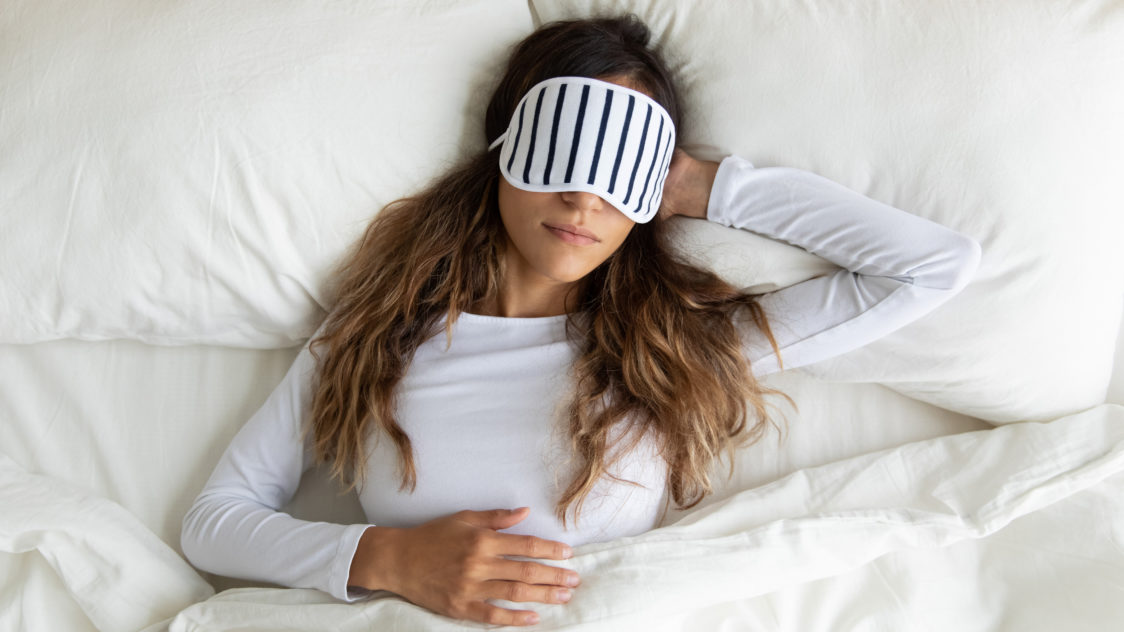
3. Move
You know that feeling when your head is full of worry and after an hour of exercise, they all slowly but surely dissipate? Movement generally has many benefits, both for your psyche and physical appearance. Regular exercise will burn large amounts of calories, which may make it easier for you to lose weight. In addition, physical activity also affects your sleep, discipline, self-esteem, as well as your health, as it can reduce the risk of developing certain diseases. [13-16]
Again, you don’t have to worry about being forced to perform unrealistically right away to promote your health. Not at all, in the beginning you will need to slowly add activities and get used to regular movement.
How to move more?
- Try to include at least a 30-minute walk several times a week.
- Try HIIT.
- Go to a gym or attend group workouts.
- You can also practice quality cardio training at home.
- Strength training in the comfort of your home.
- Go for a run.
- Get out for some cross country skiing.
- Reminisce about your childhood and go sledding or have a snowball fight.
You don’t even have to go to the gym to be active and benefit from the positives that exercise provides our bodies. It is ideal to alternate activities to make movement varied and fun for you. But if you love an activity so much that you don’t want to give it up for a while, feel free to immerse yourself in it. It’s up to you how you spend your free time.
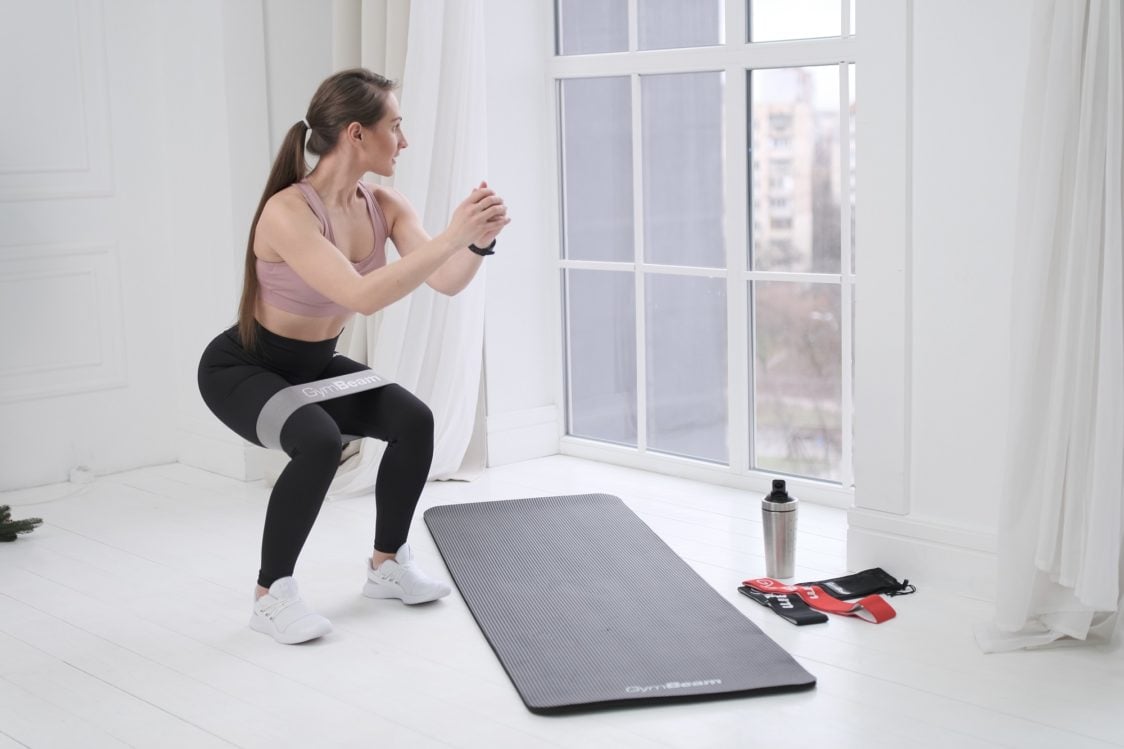
4. Spend more time outdoors
Nowadays, when we spend our days in office, at home, or in any other enclosed spaces, it is all the more important to go out into the countryside for some fresh air. Not only do you clear your mind and relax from stressful things, but if the sun is shining, you can also get vitamin D, which is a main vitamin that a large part of the population lacks especially in the autumn and winter months. Studies have even shown that just two hours a week spent outdoors can have a positive impact on your overall health and psyche.

It’s up to you whether you’re going on a long hike this weekend or for a walk in the park near your home. One study has even shown that just 5 minutes of exercise outdoors can improve your mood. And with your hand on your heart, do you really lack those five minutes during the day that can positively affect your psyche? [17-18]
How to spend more time outdoors?
- The simplest way is walking.
- Borrow a dog to walk with you so you have a partner.
- Instead of coffee with friends get out together on a walk.
- During the warmer months you can go mushroom picking in the forest.
- Take a hike into the mountains for the day.
- Get the necessary equipment and go exercise outdoors.
- Go for a bike ride, skate or jump on a scooter
There are many ways to get closer to the outdoors. If you feel you are not enjoying your walks, try playing your favourite podcast to make this time more enjoyable.
You can also try to call your loved ones and talk. But if you really want to relax your mind, leave your phone at home and just enjoy the sound of nature.
5. Work on your thinking
There are many ways to learn to work with your thoughts. If you’ve never been interested in these techniques, mindfulness can be a great way for you at first. You’re asking what it is? It is a technique that can help you reduce fatigue or stress by learning to be aware and experience the present moment. In this way, you will learn to better manage your emotions, thoughts and not be controlled by negative situations.
How to begin?
- Start by finding a position that makes you feel comfortable and relaxed. For some, it can be sitting, for others, lying down.
- Just focus on your breathing, try not to think about anything else.
- If you can’t concentrate on your breathing, try counting the seconds between breaths and exhalations, that should distract you from other thoughts.
- When things come into your head that you don’t want to think about, don’t stress about it, it’s normal at first. Try to distract yourself and concentrate on your breathing again.
If you learn to feel the moment in a quiet environment, you can try other activities over time – whilst washing dishes, focus on every single thing you wash. Similarly, with food, pay attention to taste, texture and do nothing else. In this way, you can learn to work with your mind and manage stressful situations.
Another way to work with your mind is to keep a journal. Just the process of writing, trying to put together meaningful sentences, can be reassuring to you. You may be well relieved to leave your troubles in the pages of the journal where they are safe. But you don’t just have to write down negative things. Write down what you are grateful for in life, what you wish for and what makes you happy. On days when you’re not feeling so great, you can flip through this diary to realize that it’s normal to have better and worse days, and that even the worst moments will pass, and you’ll feel great again. You can also make this your regular ritual. For example, if you spend 10 minutes each day writing down your feelings before bedtime, you will find it easier to fall asleep because you will feel that you have got rid of your worries by writing them in your journal. [19]
How do you learn to work with your mind?
- Write down your feelings, wishes or things you are grateful for.
- Focus on the future, don’t worry about the past.
- Don’t be alone in your problems, confide in your diary or your loved ones.
- Try mindfulness.
- Feel the present moment.
If you decide to include new methods in your life that will help you work better with your mind, be patient. In the beginning it may be difficult for you to even write, and it is just as difficult at first to focus on one thing. But don’t give up, practice makes a master. You’ll see for yourself that it’s going to get better and better.
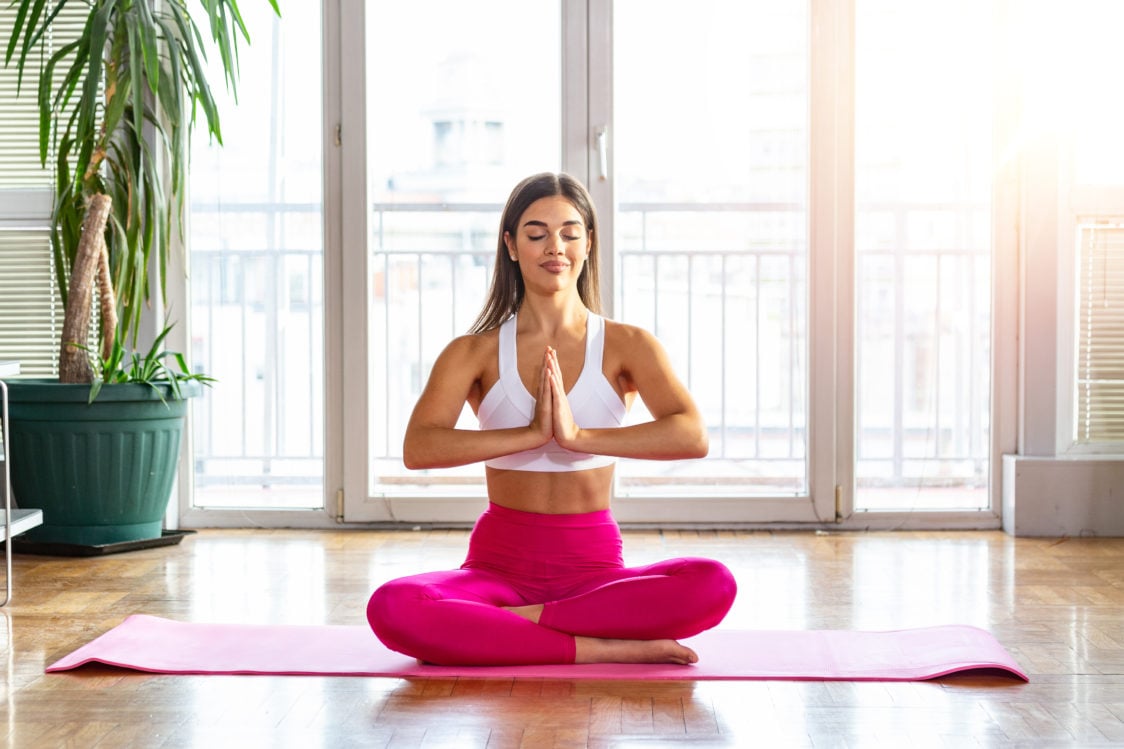
6. Try cold hardening or a sauna
Certainly, you are not the only person who is terrified by the idea of stepping out of their comfort zone in the form of a warm blanket and literally immersing themselves in icy water. However, you may be convinced by the benefits you can gain by cold hardening. In addition to a better mood and lower levels of perceived stress, you can also expect a more resistant immunity, reduced pain or better blood circulation. You can expect similar effects from sauna. [20–22]
How do you start cold hardening?
- Do not turn on the heating at home.
- Wear one less layer of clothing outside.
- Reduce the water temperature gradually whilst showering. First, shower with cold water only on the lower part of the body, gradually work your way to the upper body and head.
- In time, try hardening in an ice pond. Start calmly just by gentle immersion and gradually extend the length of time spent in the icy water.
Whether you decide to include sauna or cold hardening, start slowly and don’t overdo it from the start. For the first time, stay in the sauna for only a few minutes and gradually increase the time. As with hardening, when you can first wear one layer less clothing, gradually include a cold shower (even from the waist down) and only over time work your way into the icy water.
If you want to learn more about cold hardening, don’t miss the article How to Get Stronger Immunity Thanks to Cold Water Therapy? The story of the ice man Wim Hof may also inspire you.
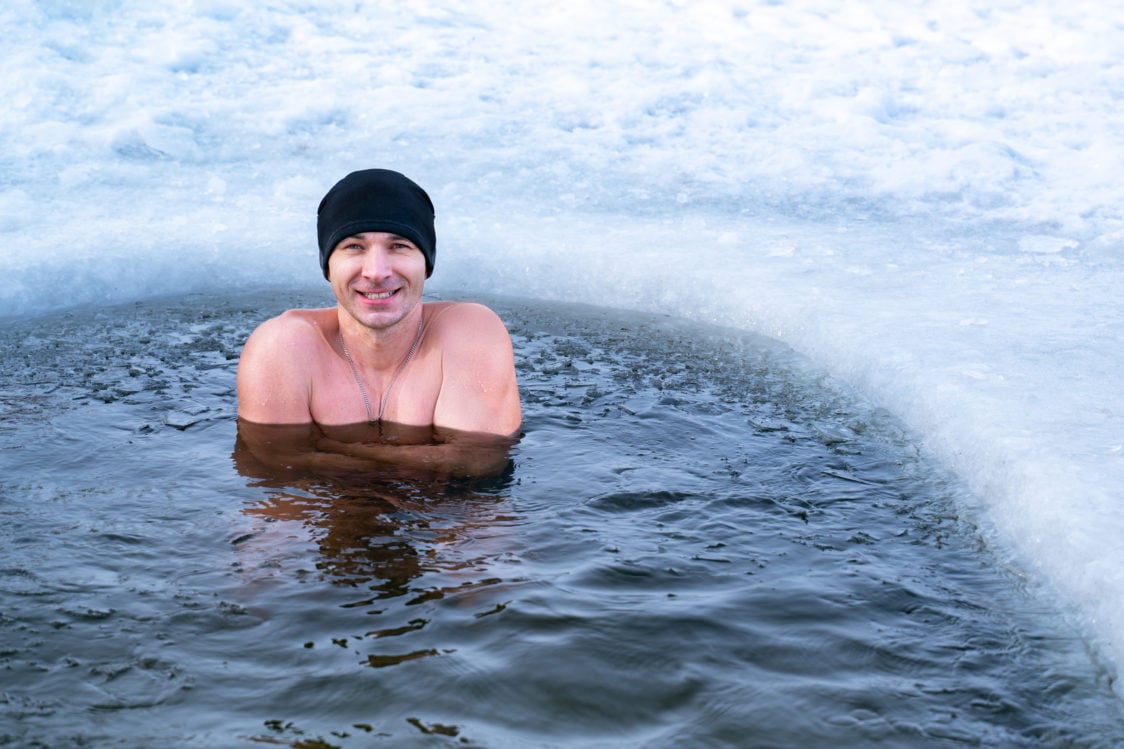
7. Try performance enhancers to help improve attention and reduce stress
Nootropics are often associated with biohacking. These are substances that help to increase the flow of blood and oxygen to the brain, which can help improve concentration or memory. Moreover, they can also increase levels of dopamine in the brain, affecting energy, attention, and alertness. However, it can also reduce the level of stress felt and the resistance of the organism, which makes it easier to cope with negative situations. [23]
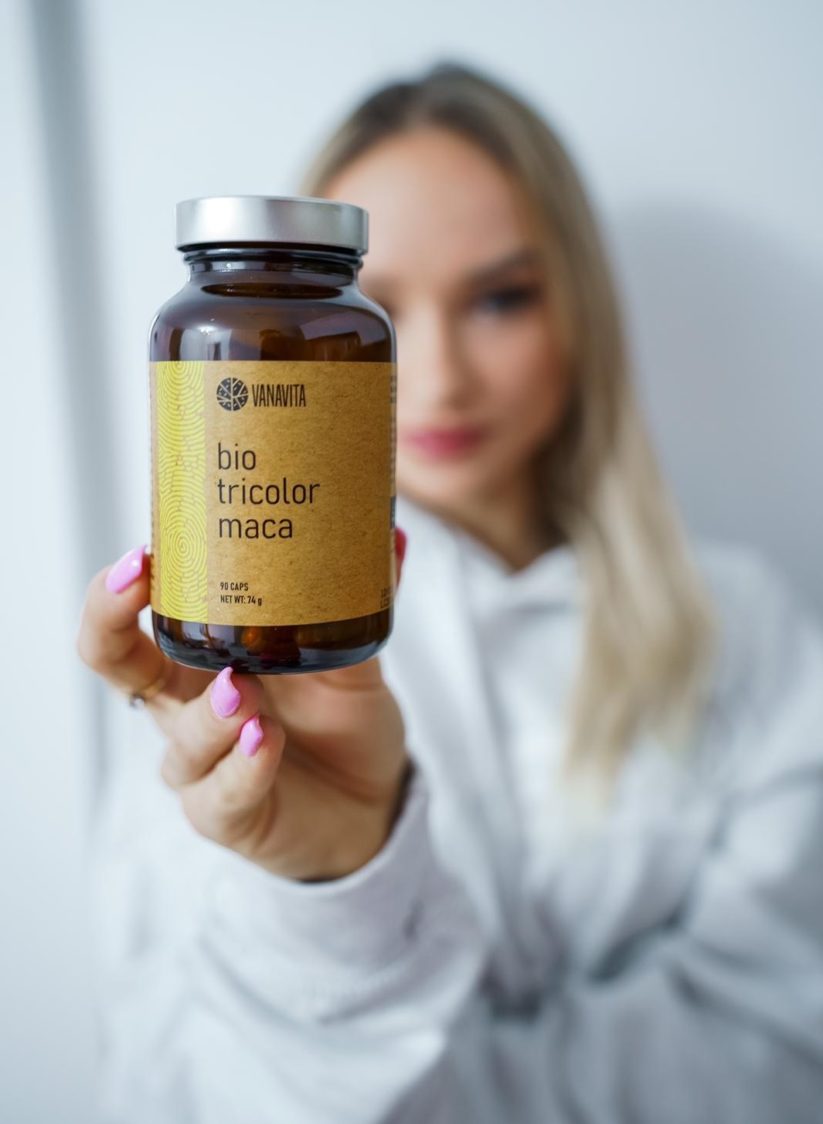
What nootropics can you try?
- Caffeine – can kick-start and stimulate the brain and delay feeling of tiredness. It can even have a positive effect on weight loss. The recommended single dose for caffeine intake is 200 mg. [24]
- L-theanine – improves attention, has relaxing effects, reduces stress perception and has a great effect in combination with caffeine, as it helps to reduce its sharp onset. This may particularly suit people more sensitive to caffeine. The recommended dose for theanine intake is between 100-200 mg. [25]
- Creatine – reduces mental fatigue, helps improve working memory and affects muscle growth and performance. The recommended long-term dosage ranges between 3-5g. [26]
- Choline – has a positive effect on cognitive function and liver health. The daily dose of choline is between 250 and 500 mg. [27]
- Rhodiola Rosea –helps reduce symptoms of stress, serves as a prevention of chronic stress and its associated complications. The daily dose of Rhodiola should not exceed 680 mg. [28]
- Maca – may indirectly affect testosterone, oestrogen, performance and endurance levels, or help reduce anxiety. The usual daily dose is between 1500 and 3000 mg. [29]
- Ashwagandha – has anti-stress effects, can help improve sleep, strength performance and affect testosterone levels. The usual dose is between 300 and 500 mg. [30]
Nootropics can undoubtedly have many benefits for your mental, physical and hormonal health. Before you start using them actively, always check the specific product of the recommended daily use. It is certainly not the case that a higher intake will produce better results. For example, with caffeine, you might experience side effects such as insomnia, nausea, dizziness, and many others as a result of an overdose, so everything in moderation.
What is the lesson?
There are many ways you can “hack” your life and improve its quality in every way. Certainly, no one is asking you to take all processed products off the menu from one day to the next, spend hours meditating, hugging trees while taking a moonlit bath in an ice lake. But keep in mind that every small step you take, such as replacing sugary soda with water, can ultimately have a big impact on your physical and mental health. So start by setting your goal, which you would like to achieve using biohacking, and gradually try new methods that can help you. You’ll see that results will come in time.
[1] Müller, M., Kersten, S. – Nutrigenomics: goals and strategies – https://doi.org/10.1038/nrg1047
[2] Neeha, V.S., Kinth, P. – Nutrigenomics research: a review – https://doi.org/10.1007/s13197-012-0775-z
[3] Cristiana Pavlidis a kol. – Nutrigenomics: A controversy – https://doi.org/10.1016/j.atg.2015.02.003
[4] Science for the Masses – https://scienceforthemasses.org/wp-content/uploads/2015/03/AReviewonNightEnhancementEyedropsUsingChlorine6.pdf
[5] Lydia Afman, Michael Müller – Nutrigenomics: from molecular nutrition to prevention of disease – https://pubmed.ncbi.nlm.nih.gov/16567153/
[6] Qingying Meng a kol. – Systems Nutrigenomics Reveals Brain Gene Networks Linking Metabolic and Brain Disorders – https://www.ncbi.nlm.nih.gov/pmc/articles/PMC4909610/
[7] Dolores Corella – Nutrigenomics in cardiovascular medicine – https://www.ncbi.nlm.nih.gov/pmc/articles/PMC2810265/
[8] Dimiter V Dimitrov – The human gutome: nutrigenomics of the host-microbiome interactions – https://pubmed.ncbi.nlm.nih.gov/21121704/
[9] Xavier Pi-Sunyer – The Medical Risks of Obesity – https://doi.org/10.3810/pgm.2009.11.2074
[10] Shahrad Taheri a kol.– Short Sleep Duration Is Associated with Reduced Leptin, Elevated Ghrelin, and Increased Body Mass Index – https://www.ncbi.nlm.nih.gov/pmc/articles/PMC535701/
[11] Cheri D Mah a kol. – The effects of sleep extension on the athletic performance of collegiate basketball players – https://pubmed.ncbi.nlm.nih.gov/21731144/
[12] Orfeu M Buxton a kol. – Sleep restriction for 1 week reduces insulin sensitivity in healthy men – https://pubmed.ncbi.nlm.nih.gov/20585000/
[13] Centers for disease control and prevention Atlanta – Physical Activity for a Healthy Weight – https://www.cdc.gov/healthyweight/physical_activity/index.html
[14] Friedenreich, Orenstein – Physical Activity and Cancer Prevention: Etiologic Evidence and Biological Mechanisms – https://doi.org/10.1093/jn/132.11.3456S
[15] Hopkins Center for Sleep – Exercising for Better Sleep – https://www.hopkinsmedicine.org/health/wellness-and-prevention/exercising-for-better-sleep
[16] Kalak a kolektiv – Daily Morning Running for 3 Weeks Improved Sleep and Psychological Functioning in Healthy Adolescents Compared With Controls – https://doi.org/10.1016/j.jadohealth.2012.02.020
[17] White, M.P. a kol. – Spending at least 120 minutes a week in nature is associated with good health and wellbeing – https://doi.org/10.1038/s41598-019-44097-3
[18] Jo Barton, Jules N Pretty – What is the Best Dose of Nature and Green Exercise for Improving Mental Health? A Multi-Study Analysis – https://www.researchgate.net/publication/42587600
[19] Valikhani – The relationship between dispositional gratitude and quality of life: The mediating role of perceived stress and mental health – https://www.sciencedirect.com/science/article/abs/pii/S0191886918306494?via%3Dihub
[20] Leppäluoto, J. a kol. – Effects of long‐term whole‐body cold exposures on plasma concentrations of ACTH, beta‐endorphin, cortisol, catecholamines and cytokines in healthy females – https://doi.org/10.1080/00365510701516350
[21] Manolis, A., Manolis, S., Manolis, A., Manolis, T., Apostolaki, N., & Melita, H. – Winter Swimming: Body Hardening and Cardiorespiratory Protection Via Sustainable Acclimation – https://doi.org/10.1249/JSR.0000000000000653
[22] Kox, M., van Eijk, L. T., Zwaag, J., van den Wildenberg, J., Sweep, F. C. G. J., van der Hoeven, J. G., & Pickkers, P. – Voluntary activation of the sympathetic nervous system and attenuation of the innate immune response in humans – https://doi.org/10.1073/pnas.1322174111
[23] Leena Sakhare Vitthalrao – NOOTROPICS AGENTS: PHARMACEUTICAL ASPECT, COMMON EXAMPLES AND THEIR APPLICATIONS – https://doi.org/10.22270/jddt.v8i5-s.1940
[24] Reza Tabrizi a kol. – The effects of caffeine intake on weight loss: a systematic review and dos-response meta-analysis of randomized controlled trials – https://pubmed.ncbi.nlm.nih.gov/30335479/
[25] Theanine – https://examine.com/supplements/theanine/
[26] Creatine – https://examine.com/supplements/creatine/
[27] Choline – https://examine.com/supplements/choline/
[28] Rhodiola Rosea – https://examine.com/supplements/rhodiola-rosea/
[29] Maca – https://examine.com/supplements/maca/
[30] Ashwagandha – https://examine.com/supplements/ashwagandha/

